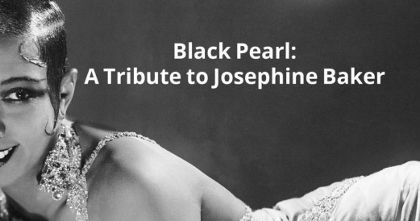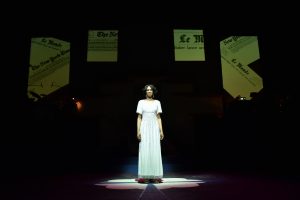C’EST SI BON!
She was infamous for her 1927 “costume” in Un Vent de Folie’”a girdle of bananas. In 1934 she became the first African American woman to have a major role in a film. Acquiring four husbands and lovers from both sexes, she became the toast of Paris’”rather than remain in America, a second-class citizen in the supposed land of the free. In Vichy France, she served as a spy in the French resistance and later received the Croix de Guerre from Charles de Gaulle. Forcing change on bigots, when she was in the U.S., she refused to perform before segregated audiences. After her husband’s assassination, Coretta Scott King offered her a leadership position but she wouldn’t let it distract her from her many adopted children.
This fabled creature was, of course, Josephine Baker (born Freda McDonald), otherwise known as the Black Pearl, Bronze Venus, and Creole Goddess. She died in 1975 at the age of 68, shortly after her triumphant appearance at Carnegie Hall, a comeback engineered by no less than the late Princess Grace of Monaco. She deserves this show.
The latest cultural reclamation from Black Ensemble Theater, Black Pearl: A Tribute to Josephine Baker more or less electrifies the huge thrust stage. We’re regaled with musical highlights from a storied star, with biographical interludes written by director Daryl Brooks to connect the triumphs and make sense of a complicated career.
Stylish and slim, Joan Ruffin narrates and performs as Older Josephine, while the well-named Aeriel Williams soars as her younger, wilder self. As Aaron Quick’s period projections chart Baker’s 50 years in showbiz, Black Pearl hardly misses a hit. It traces her talent to her vaudeville parents (“Bill Bailey, Won’t You Please Come Home?”) in St. Louis, glancing over the paternity issue that dogged her origins. Killing off Freda (a name she loathed), a hungry Josephine defied her mother who for five years hired her out as a servant treated by white bosses no better than their dogs. (Much later she let her mother live with her in France.)
Encouraged by the great Bessie Smith (Rhonda Preston belting “The Lost Your Head Blues”) and discovered by the terrific music-hall team of Eubie Blake and Noble Sissle (Scott Joplin’s “Maple Leaf Rag”), Josephine became a tap-dancing phenom (“Blue Skies”) at only 15: Loving the freedom that her long legs and flying feet delivered, she cavorted as much for herself as for her growing crowds.
Mildly protesting having to perform half-naked (she soon got quite used to that), she invented on the spot her own impudent choreography, a standout among the hoofers in 1925’s Shuffle Along (“I’m Just Wild About Harry”), Broadway’s first black musical. All but incarnating the roaring 20s, by 19 Josephine Baker (she kept the name of her favorite husband) was a Jazz Age jewel. She joined a showcase of American up-and-comers that played Paris, a tour that changed her home and, eventually, nationality.
The second act celebrates her French fame (“La Vie en Rose”) where she indulged in Afro-centric extravaganzas (“Banana Dance”), Folies Bergeres frivolities that bought her a medieval chateau.
In later scenes, where Brooks’ script becomes perfunctory and episodic as it laments her inevitable decline, Baker fends off husband troubles and tragedies. Her adored “Pepito”’”French industrialist Jean Lion who she married in 1937’”dies of cancer. Her last husband was plagued by mouths to feed and quiet: An overcompensating Josephine developed an unhealthy obsession with acquiring nearly a dozen children, ostensibly to make up for her lonely and unhappy childhood. Since the former Queen of Paris spent more than she saved, her 60s were full of unwilling renunciations. But, resplendent at the end, Ruffin’s radiant Josephine joins Aeriel’s equally entrancing Josephine to echo Frank Sinatra’s independence of heart, scorching the stage with his standard, a house-melting “My Way.”
Happily, the good and hard times fend equally well in B.E.T.’s gorgeous recreation, its 18 musical numbers well shaped by the excellent Robert Reddrick and a combo of seven. The 14 cast members are everything and everywhere, perfect for their periods and blessings to their songs and dances.
Black Pearl: A Tribute to Josephine Baker
Black Ensemble Theater Cultural Center
4450 N. Clark Street
Thurs at 7:30; Fri at 8; Sat at 3 & 8; Sun at 3
ends on June 18, 2017
for tickets, call 773.769.4451 or visit Black Ensemble Theater
for more shows, visit Theatre in Chicago











